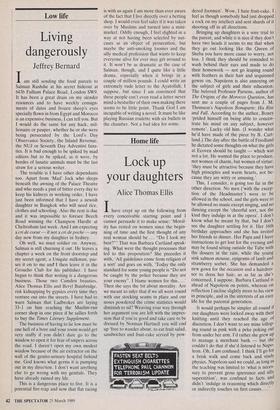Home life
Lock up your daughters
Alice Thomas Ellis
Ihave crept up on the following from every conceivable starting point and I cannot persuade it to make sense: 'Moral- ity has rested on women since the begin- ning of time and the first thought of any real woman should be ... "Do I look my best?" That was Barbara Cartland speak- ing. What were the thought processes that led to this proposition? She precedes it with, 'All guidelines come from religion of a sort' and goes on with, 'Today the only standard for some young people is "Do not be caught by the police because they are your enemy". I blame women for this....' Then she says the bit about morality. Are we meant to infer that if we all went round with our stocking seams in place and our noses powdered the crime statistics would diminish to nil? Weaving your way through her argument you are left with the impres- sion that if you're good and take care to be dressed by Norman Hartnell you will end up 'free to wander about, to eat fruit salad, sandwiches and fruit-cake served by pow-
dered footmen'. Wow, I hate fruit-cake. I feel as though somebody had just dropped a rock on my intellect and sent shards of it shooting off in all directions.
Bringing up daughters is a sore trial to the parent, and while it is nice if they don't have two heads it seems to me that when they go out looking like the Queen of Sheba you have more cause to worry, not less. I think they should be reminded to wash behind their ears and made to do their homework — not go leaping round with feathers in their hair and sequinned gowns on. Napoleon is also annoying on the subject of girls and their education. The beloved Professor Parsons, author of The Origins of the Morocco Question, has sent me a couple of pages from J. M. Thomson's Napoleon Bonaparte: His Rise and Fall. According to the author, Boney 'prided himself on being able to concen- trate his mind on any subject, however remote'. Lucky old him. (I wonder what he'd have made of the piece by B. Cart- land.) The day after the battle of Friedland he dictated some thoughts on what the girls at Ecoven should be taught — which was not a lot. He wanted the place to produce, not women of charm, but women of virtue: 'they must be attractive because they have high principles and warm hearts, not be- cause they are witty or amusing.'
This, I consider, is going too far in the other direction. No men ('with the excep- tion of the Headmaster') were to be allowed in the school, and the girls were to be allowed no music except singing, and no dancing except the 'cheerful sort, not the kind they indulge in at the opera'. I don't know what he meant by that, but I don't see the daughter settling for it. Her 16th birthday approaches and she has invited her friends to dinner. Her Papa and I have instructions to get lost for the evening and may be found sitting outside the Tube with the dossers in the rain, while the young sink salmon mousse, epigrams of lamb and strawberry sorbet. She has demanded a new gown for the occasion and a hairdres- ser to dress her hair; so as far as she's concerned, I suppose, Barbara Cartland is ahead of Napoleon on points, whereas on reflection I incline slightly more to his view in principle, and in the interests of an easy life for the parental generation.
It would perhaps be simpler all round if our daughters were locked away with their knitting until they reached the age of discretion. I don't want to see mine lollop- ing round in pink with a peke poking out from under her arm. I'd rather she grew UP to manage a merchant bank — but she couldn't do that if she'd listened to Napo- leon. Oh, I am confused. I think I'll go for a brisk walk and come back and study physics. Napoleon said we could, as long as the teaching was limited to 'what is neces- sary to prevent gross ignorance and silly superstition', was confined to facts and didn't 'indulge in reasoning which directly or indirectly touches on first causes...


















































 Previous page
Previous page